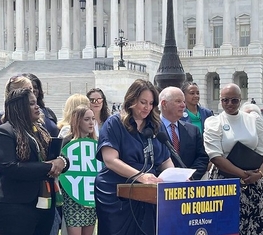League of Women Voters of Wisconsin Files Lawsuit to Reactivate 31,854 Voters
The League’s second challenge to unjust voter purges in Wisconsin seeks to reinstate voters before 2022 midterm elections
MADISON — Today, the League of Women Voters of Wisconsin, represented by Fair Elections Center, Law Forward Inc., and Stafford Rosenbaum LLP, filed suit in federal court to reinstate more than 31,000 registered Wisconsin voters who were purged from the voter rolls in July 2021. These voters were not provided notice of the potential deactivation or the deadline to take action to avoid deactivation and therefore were unlawfully removed from the rolls. The League is seeking the reactivation of all 31,854 voter registrations.
“This year, over 30,000 voters were purged from the registration rolls without warning,” said Debra Cronmiller, executive director of the League of Women Voters of Wisconsin. “Because these voters were not notified that their registration had changed, they could show up to the polls without the needed proof of residency to successfully complete a same-day registration. Losing the opportunity to cast a ballot due to an administrative oversight is too high a price to pay. These voters’ registrations must be reinstated, and adequate notice must be given to all future voters identified for purging as a part of list maintenance.”
Two years ago, the League filed nearly the same lawsuit, arguing the Wisconsin Elections Commission’s (WEC) letter to over 200,000 voters suspected of moving based on Electronic Registration Information Center (ERIC) data, had failed to give voters notice of deactivation or a deadline by which they needed to take action. That prior case was dismissed pending the outcome of parallel state court litigation. Once that litigation was resolved earlier this year, the WEC deactivated the remaining 31,854 voters on the list on July 31.
The lack of notice was never cured before this summer’s mass deactivation, and the Commission’s actions are in violation of the U.S. Constitution’s guarantee of due process. The League has refiled its lawsuit to enforce this bedrock constitutional principle.
“Voter list maintenance is an important part of election administration, and it must always be performed using reliable data and adequate opportunity for voters to respond," said Celina Stewart, chief counsel of the League of Women Voters of the United States. "Voters must have some control around their registration status every step of the way.”
“The Wisconsin Elections Commission could deactivate these voters’ registrations after providing them with notice and giving them an opportunity to respond. But they never did that, so they cannot purge them,” said Jon Sherman, litigation director and senior counsel at Fair Elections Center. “The passage of two years since the first round of this litigation does not mean the requirement to give voters notice is somehow waived. Time does not heal constitutional wounds.”
“As we head into another election year, we remain committed to vindicating the freedom to vote for Wisconsinites, including the 31,854 individuals whose voter registrations were improperly deactivated,” said Dan Lenz, staff counsel at Law Forward Inc. “We can all agree that a voter should not be made ineligible to vote without the notice guaranteed by the Constitution.”
“A voter’s registration to vote in Wisconsin is a constitutionally protected interest. That right cannot be taken away from any Wisconsin voter without an appropriate process. The state failed to follow that process, and so we are going back to court to ensure that the Wisconsin Elections Commission gets the message loud and clear that they must abide by the US Constitution,” said Doug Poland, partner at Stafford Rosenbaum and co-chair of its Election and Political Law team.
Other key legal documents in the case can be found here.
###
PRESS CONTACT: Kayla Vix | 202-809-9668 | [email protected]
The Latest from the League
LWVWI filed a federal lawsuit challenging a planned voter roll purge based on unreliable data. Voters had 30 days to respond to a letter about their purge status, a timeline that is only allowed with reliable data.
LWV of Wisconsin filed an application in the U.S. Supreme Court that would provide voters with a back-up option to receive delayed mail-in absentee ballots.
A federal court in Wisconsin gave voters a back-up option to receive mail-in absentee ballots online or via email when they do not receive their previously-requested ballot in the mail in time for the November 3 general election.
Sign Up For Email
Keep up with the League. Receive emails to your inbox!
Donate to support our work
to empower voters and defend democracy.





